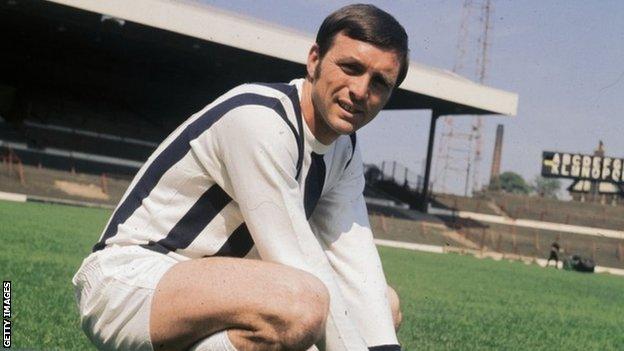Dementia in football: PFA to create taskforce to examine issue of brain injury diseases
Last updated on .From the section Football
The Professional Footballers' Association is setting up a new taskforce to further examine the issue of brain injury diseases in football.
It has been criticised for its lack of support by families of ex-footballers who have died of or have dementia.
It plans to reach out to ex-Blackburn and Chelsea forward Chris Sutton, whose father, Mike, has dementia.
The union will also engage with Dawn Astle, the daughter of former West Brom and England striker Jeff Astle.
Neuropathologist Dr Willie Stewart said Astle died of a brain condition normally linked to boxers, and that it was caused by heading footballs.
Stewart's research into the issue, which was commissioned by the PFA and Football Association - found that former footballers were between two and five times more likely to die from degenerative brain diseases.
The PFA said on Monday that it would continue to fund Stewart's research at Glasgow University.
The introduction of a taskforce comes amid criticism from the family of 1966 World Cup winner Nobby Stiles, who said football needs to "address the scandal" of dementia in football.
The ex-Manchester United and England midfielder died in October, aged 78, after suffering from dementia and prostate cancer.
Stiles is the fifth member of England's World Cup-winning squad to have been diagnosed with the brain injury disease.
Speaking to BBC Radio 5 Live, Sutton, whose father played for Norwich, Chester and Carlisle, said: "Not enough is being done and the players of Nobby Stiles' generation aren't getting looked after well enough. It's as simple as that.
"It's not just the dementia sufferer, it's actually the effect that has on the families.
"I know only too well the effect it has had on my mother."
On Tuesday, the PFA said its charity "offers a range of support to former professional footballers and their families and carers" and was "listening to member feedback and evaluating ways to improve the services and care provided".
It added: "The PFA will continue to fund research as part of a working group, comprised of stakeholders from across the game. Currently, we are funding three separate studies looking at neurodegenerative conditions and football."
Heading in training 'more detrimental'
On Wednesday, World Cup winner Sir Geoff Hurst told BBC Breakfast he thought heading a football in training is "probably more detrimental" to players than in matches.
Hurst, who wants to donate his brain to dementia research, believes links between heading and dementia are "more than a coincidence".
"You could look at some of the games I played in where I hardly headed the ball, but it's the practice," he said.
"I look at my club West Ham, we had a ball hanging from the ceiling in the gym, you'd spend half an hour, 45 minutes practising heading a ball swinging from the ceiling.
"We'd play head tennis in the gym and then you get onto the field and you'd practice what we were well-known for at West Ham which was the near-post crosses and the near-post headers. The practice of that could be 20 minutes, half an hour.
"So the enormous amount of practice of heading the ball is probably more detrimental to players than in a match."


- Life After Reality TV: Love Island and basketball star Ovie Soko
- Racism in Football: See the scale of the problem in the game




















